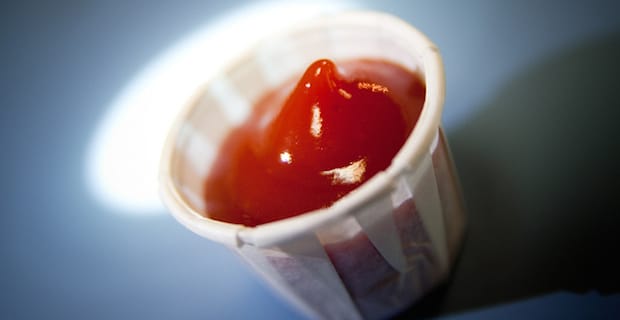
On average, Americans consume between 18 to 23 teaspoons of sugar a day – that’s about 1/3 of a pound, adding up to approximately 120 lb of sugar each year.(1) About 35 lb of that sugar is in the form of high fructose corn syrup (HFCS).
Too much of any type of sugar is unhealthy, but high fructose corn syrup is not the same as other forms of sugar, and it is undeniably the most dangerous.
Known as glucose-fructose in Canada, high fructose corn syrup is made from cornstarch that has been processed with enzymes and acids. Like table sugar (sucrose), its two components are glucose and fructose, but it’s far less expensive than sugar to produce.
The sweetness of high fructose corn syrup blends well with processed foods and drinks, and over the past 40 years, it has replaced sugar in thousands of foods. According to ConsumerReports.org, there was a 1,000 percent increase in the consumption of high fructose corn syrup between 1970 and 1990. Fortunately, this number is dropping as consumers look for and avoid foods and beverages listing the dangerous ingredient on their food labels.
High fructose corn syrup can be found in a wide variety of foods, some of which don’t even taste sweet. It can be found in boxed cereals, ketchup, ice cream, granola bars, cookies, crackers, sauces, salad dressings, and even in pickles, cold cuts and bread (high fructose corn syrup sandwich, anyone?).
The major source of high fructose corn syrup is not food, however, but beverages. It’s the main sweetener in most sodas, many juices and sports drinks too.
Read more about surprising foods HFCS is found in
A 12 oz. can of soda can contain anywhere from 7 to 12 teaspoons of sugars from high fructose corn syrup. A 20 oz. bottle of soda contains from16 to 20 teaspoons! That equates to 300 – 400 calories of liquid sugar.
The problem with high fructose corn syrup is the fructose. Fructose circumvents the body’s normal appetite signaling system, leaving you feeling unsatisfied and causing you to eat more. Also, when fructose is consumed in high amounts, the liver converts much of it to fat rather than breaking it down like other types of sugar. Consequently, high fructose corn syrup has been blamed for the climbing obesity rates and a range of health problems associated with obesity, including insulin resistance, metabolic syndrome, type 2 diabetes, heart disease, elevated LDL and triglycerides, inflammation, hypertension and many forms of cancer.
A study published in the journal Global Health found that countries consuming the highest amounts of high fructose corn syrup had diabetes rates about 20 percent higher than other countries.
Another health concern related to high fructose corn syrup is allergies. Firstly, the additive is made from genetically modified (GM) yellow dent corn. Genetically modified organisms (GMOs) have been linked to allergies, as well as tumors in rats.
Secondly, if you have a corn allergy, ingesting foods or drinks containing high fructose corn syrup may cause symptoms such as:
- An itchy sensation or swelling in your mouth
- Abdominal pain
- Difficulty breathing
- Eczema
- Hives
- Nausea, vomiting or diarrhea
If you have an intolerance to corn, ingesting high fructose corn syrup may cause:
- Abdominal pain
- Arthritis
- Diarrhea
- Fatigue
- Fibromyalgia
- Fluid retention
- Headaches
- Muscle aches
- Rashes
- Wheezing
You can also have or develop an intolerance to fructose. Symptoms may include:
- Abdominal pain
- Bloating
- Constipation
- Diarrhea
- Flatulence
Most people with fructose intolerance (also known as fructose malabsorption) are unaware of the problem, but it is a common factor in irritable bowel syndrome. If you suspect you have fructose malabsorption, ask your doctor to test you with a hydrogen breath test.
Read more about fructose and overeating
Despite the evidence and health risks associated with high fructose corn syrup, The Food and Drug Administration classifies the additive as Generally Recognized as Safe (GRAS) and recommends that consumers limit all forms of sugar. So it’s up to you to be aware of the sources and to avoid high fructose corn syrup at all costs.
References:
www.forbes.com/sites/alicegwalton/2012/08/30/how-much-sugar-are-americans-eating-infographic/
www.thenews.com.pk/Todays-News-5-159118-High-fructose-corn-syrup-linked-to-diabetes
www.cspinet.org/new/201302131.html
jama.jamanetwork.com/article.aspx?articleid=1555133
Stanhope KL, Bremer AA, et al. Conusmption of Fructose and High Fructose Corn Syrup Increase Postprandial Triglycerides, LDL-Cholesterol, and Apolipoprotien-B in Young Mend and Women, J Clin Endocrinol Metab, October 2011, 96(10):E1596-E1605, jcem.endojournals.org
Image: Steven Depolo




